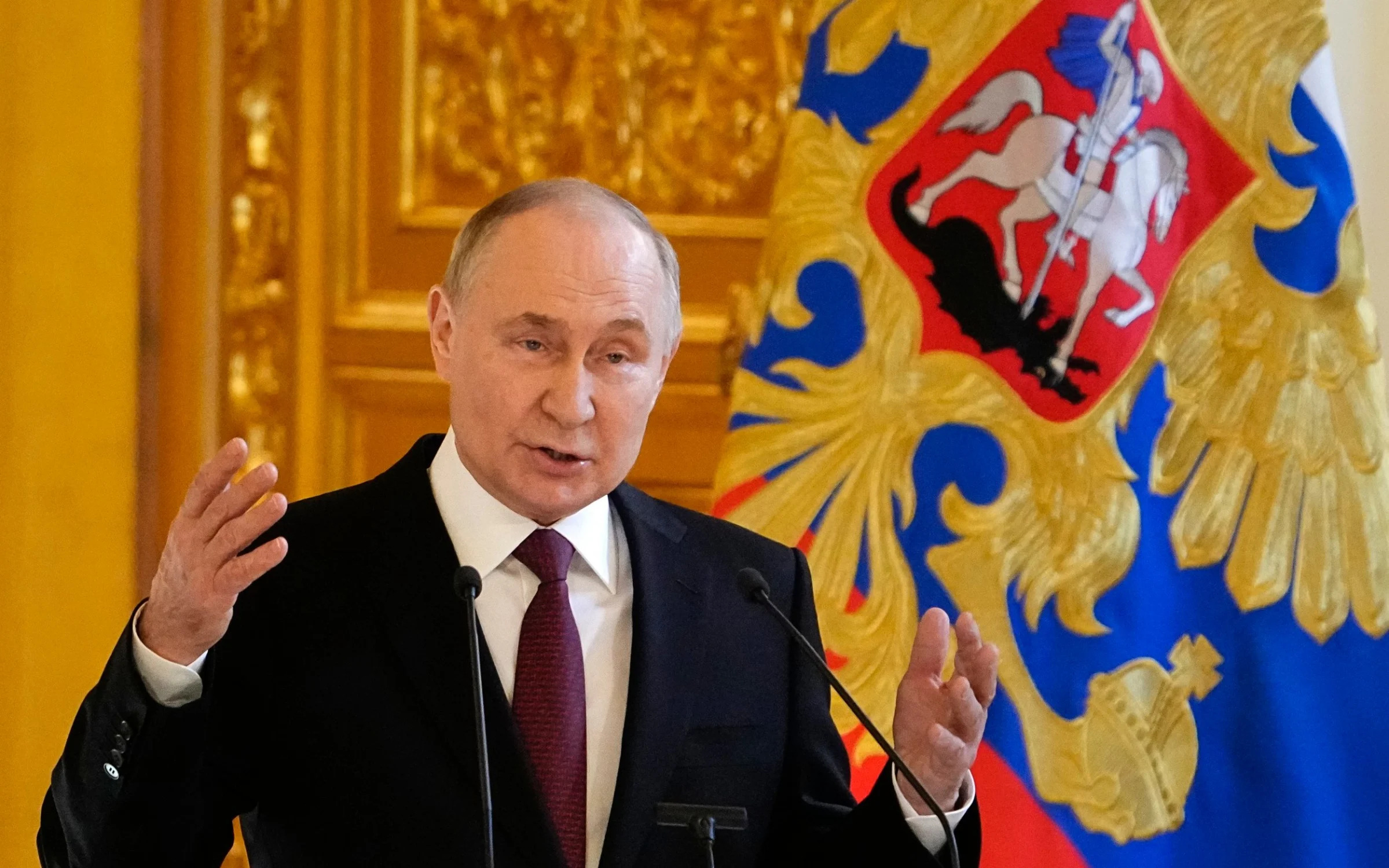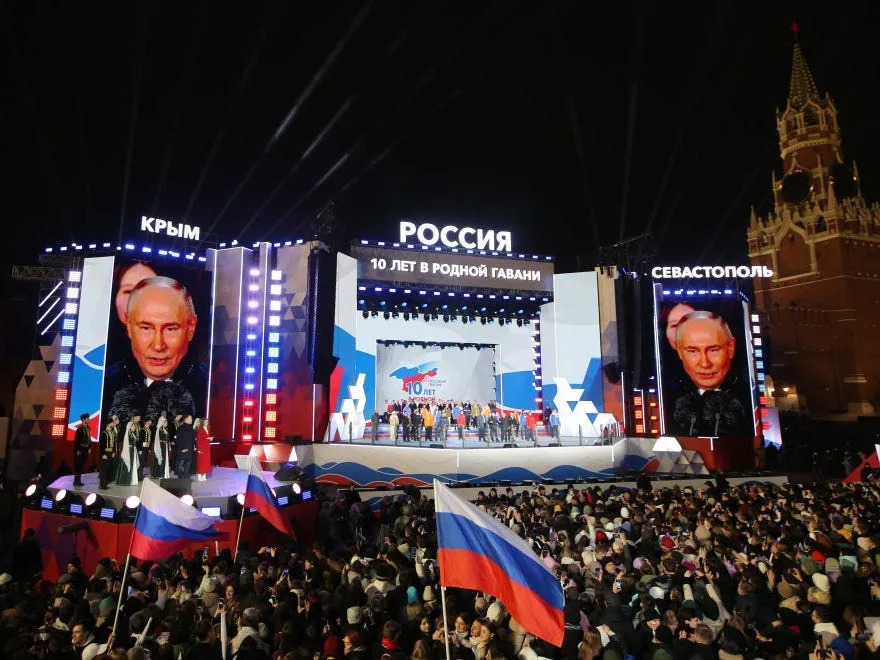Now that Russian President Vladimir Putin has secured his historic fifth term in office, it is patently clear that he will devote his next six-year spell at the Kremlin to pursuing his paranoid obsession of confronting the West.
Having recorded a post-Soviet era record of winning nearly 88 per cent of the votes, Putin used his victory to remind Russians that they would never be intimidated by the West.
“No matter who or how much they want to intimidate us, no matter who or how much they want to suppress us, our will, our consciousness – no one has ever succeeded in anything like this in history,” he said. “It has not worked now and will not work in the future. Never.”
According to Putin’s narrative, he is fighting Western attempts to diminish Russia through a relentless effort to persuade countries, such as Ukraine, that previously fell under Moscow’s sphere of influence to join Nato and the European Union.
This means the 71-year-old Putin will feel fully justified in exploiting his massive election victory to continue pursuing his agenda of trying to rebuild Russia into a global superpower, even if it runs the risk of provoking a major conflict with the West.
The Russian president certainly did not shy away from the issue when asked a question about the possibility of becoming involved in a direct confrontation with the West during his post-election press conference.
“I think everything is possible in the modern world … it is clear to everyone that this will be one step away from a full-scale Third World War.”
Putin’s remarks vindicate recent comments made by Nato leaders warning that the full extent of the Russian leader’s territorial ambitions extend far beyond the confines of Ukraine.
The US president, Joe Biden, stated back in December that Putin is planning to attack a Nato country once he has finished in Ukraine, while in January Admiral Rob Bauer, the chair of Nato’s military committee, called on the alliance’s member states to be ready to fight an all-out war with Russia within the next 20 years.
Nothing Putin has said in the wake of his election success should disabuse anyone of the view that the Kremlin clearly means business in terms of escalating its confrontation with the West. It is an assessment, furthermore, that should serve as a wake-up call for Nato states like Britain that remain in a state of denial about the ability of their armed forces to meet the challenge the Kremlin’s bellicose mentality poses to European security.
This week’s warning, for example, by Kosovo’s prime minister Albin Kurti that Britain needs to send more troops to help prevent Russian-backed Serbian forces from invading his country is just the latest example of Moscow’s expansionist designs.
While ministers continue to insist that the UK military retains the means to keep the country secure, that is palpably not the view of highly-experienced former defence chiefs who, free from the restrictions of their former ranks, have laid bare the inadequacy of the Government’s efforts to equip the military for the very real challenge Putin presents.
In a paper published this week by the New Bletchley Network, such luminaries as Lord Robertson, the former New Labour defence secretary and Nato secretary-general, and Lord Sedwill, who served as national security adviser under Theresa May and Boris Johnson, publicly called on the Government to address the issue of rearmament with the seriousness it deserves.
“To be credible in deterrence terms, we need to prepare genuinely for war and communicate this to potential foes, Nato and allies, and particularly to the British public,” the paper warns. A top priority, moreover, should be to rebuild the Army which, at its current strength of around 75,000 – its smallest since the Napoleonic era – has been reduced “far below national critical mass”.
Coming from such distinguished and respected figures in our defence establishment as these, Downing Street would be well-advised to take heed of their sage counsel, instead of endlessly resorting to its tired refrain that it aims to increase defence expenditure to 2.5 per cent of GDP “when fiscal and economic circumstances allow”.
The same applies to our allies in Europe, where the distinct prospect of Donald Trump winning November’s presidential election has galvanised many European states into increasing their defence expenditure to meet Nato’s 2 per cent of GDP requirement.
While just three Nato countries met their Nato obligation in 2014, that figure is likely to rise to 19 this year. But that still leaves another 13 countries failing to pay their dues, an omission that will not be lost on Trump who, in his GB News interview with Nigel Farage this week, said he remained committed to Nato – so long as the Europeans pay their way.
It is quite remarkable that, with Putin now openly threatening Europe’s borders, and Trump questioning Nato’s future, there are still countries that remain unwilling to fulfil their defence responsibilities. If Putin’s re-election fails to stir them from their torpor, perhaps nothing will.
Putin is ready to squeeze Russia's outrageously wealthy elite to fund a future war with NATO, analysts say
Putin is ready to squeeze Russia's outrageously wealthy elite to fund a future war with NATO, analysts say
-
Vladimir Putin is moving to squeeze Russia's wealthy elite, a think tank said.
-
He needs the money to boost military spending, analysts said, and is prepared to ruffle feathers.
-
Analysts said it's a sign Putin's readying for a war with NATO.
Russian President Vladimir Putin is preparing to squeeze Russia's wealthy elite to fund a conflict with NATO, a think tank said.
The Institute for the Study of War, a US think tank, drew attention to two recent speeches in which Putin voiced rare criticism of the rich loyalists who've been the backbone of his power.
In a Tuesday meeting with leaders from Russia's lower parliament, the Duma, Putin set out the priorities for his new term in office.
He urged officials to "act in the interest of the state instead of corporations or parties."
The remarks could be seen as a thinly veiled swipe at the widespread corruption that characterizes modern Russia (and from which, Putin's critics allege, he has also handsomely benefited).
In similar remarks given about a month before to Russia's Federation Council, Putin said that "individuals who 'lined their pockets' in the 1990s" — who are among its crop of oligarchs — are not the real elite.
The actual elite, he said, "are workers and military servicemen who proved their loyalty to Russia."
The ISW said the remarks indicated that Putin was sending a warning shot to the "siloviki," the wealthy ex-security officials who form an important part of his power base.
Taken together, the remarks pick away at the long-standing implicit bargain analysts say Putin struck with the country's wealthy, agreeing to leave their riches untouched in exchange for political support.
The ISW said Putin was changing tack, "signaling that Russia's long-term financial stability will require imposing at least some pain on some wealthy industrialist siloviki," it said.
Putin appears willing to risk his accord with his wealthy backers to boost preparations "for a potential future large-scale conflict with NATO," the ISW said.
The report comes after a series of warnings from Western leaders that Putin might be preparing for a war with the West.
Denmark's defense minister said it could come in as little as five years.
The NATO alliance has provided Ukraine with crucial support in fighting the Russian invasion, and Putin has repeatedly menaced the alliance with the prospect of nuclear war.
Analysts say that the Russian president has long harbored ambitions to seize back control of territory in northern and eastern Europe that was once part of the Soviet Union and that victory in Ukraine could embolden him.
But fulfilling that ambition would not come cheap.
Who are the siloviki?
When Putin came to power in 1999, he moved to punish some who had grown wealthy during the liberalization of Russia in the '90s.
Specifically, he took on those who challenged him, such as the oil magnate Mikhail Khodorkovsky.
A new faction expanded its power under Putin, the siloviki.
Some were handed control over state energy companies and corporations in an apparent exchange for their loyalty, becoming vastly wealthy.
The US sought to undermine Putin's power by targeting the assets of Russia's wealthy loyalists in a series of sanctions in the wake of the Ukraine war's start.
But the Russian economy has managed to withstand the worst effects of the fallout from the Ukraine war, and the loyalty of Putin's wealthy backers has mostly held firm.
Some members of the Russian business elite were critical of the Ukraine war, fearing the effects on Russia's economy and society. But, The Guardian reported, many have since resigned themselves to the war and Putin's continued rule.
And it's not just Putin's willingness to shake up his relationship with his wealthy loyalists that indicates his readiness to rapidly expand Russia's military.
Sergei Shoigu, Russia's defense minister, announced plans Wednesday to massively expand Russia's armed forces by creating two new armies.
Analysts say that Russia is also expanding its military presence in Russia's northwest, near the borders with NATO's Baltic allies.
"Several Russian financial, economic, and military indicators suggest that Russia is preparing for a large-scale conventional conflict with NATO," the ISW said, "not imminently but likely on a shorter timeline than what some Western analysts have initially posited."
Putin just gave Russia's post-KGB spy network a new job
-
Russian President Vladimir Putin has tasked Russia's FSB spy network with helping businesses counter Western sanctions.
-
The move follows increased Russian spy activity since Russia started the war in Ukraine.
-
It shows how Moscow is aiming to counter tightening trade restrictions from the West.
Russian President Vladimir Putin just gave Russia's post-Soviet KGB spy network an assignment: counter Western sanctions and help Russian businesses expand into new markets.
On Tuesday, Putin — a former KGB agent himself — called on the Federal Security Service, or FSB, spy network "to provide support to our companies that are actively developing despite the obstacles created for them and which are exploring new markets but are faced with openly hostile actions" from the West, Reuters reported.
Putin's instructions to the spy service at its annual meeting in Moscow followed his carefully engineered victory in Russia's presidential election over the weekend.
It provides a glimpse into how Moscow is aiming to counter tightening trade restrictions from the West.
Russia's economy appears resilient two years after starting the war in Ukraine. Russia's GDP grew 3.6% in 2023 and the International Monetary Fund expects its economy to grow 2.6% this year. Unemployment is around a record low, and wages are soaring.
Russia has managed to keep its economy humming by pivoting its trade to alternative markets including India, China, and Iran. It's even building rail lines to create what one analyst called "a trade route for pariahs" with heavily sanctioned Iran.
However, the West is closing up loopholes in its sanctions regime and ratcheting up pressure on global businesses still doing business with Russia.
On Tuesday, Putin himself admitted the sanctions have created "temporary problems for us," but added he was sure "everything, of course, will be done anyway."
Russia's spy activity has hit the highest levels since the Cold War following Moscow's invasion of Ukraine, the Financial Times reported earlier this month, citing unnamed Western intelligence officers.




